
The IAF's offensive focused on 11 Pakistani airbases, including Nur Khan, Sargodha, Skardu, Murid, and Rafiqui. These bases are integral to Pakistan's aerial command and strike capabilities. The strikes resulted in substantial damage to infrastructure and the reported downing of several Pakistani aircraft, including a SAAB-2000 Airborne Early Warning and Control System , two F-16s, a JF-17 Thunder, and a C-130J transport aircraft. Indian sources indicated that the S-400 missile defence system was activated multiple times during the engagement, underscoring the intensity of the confrontation.
In response to the IAF's actions, Pakistan initiated Operation Bunyan Marsoos, launching retaliatory strikes on Indian military targets. These included airbases in Udhampur, Pathankot, Bhuj, and Bathinda. Pakistan's military spokesperson, Lt. Gen. Ahmed Sharif Chaudhry, confirmed the counterattacks, asserting that all Pakistani strategic assets remained secure. However, Indian officials reported some damage to equipment and personnel at the targeted bases.
The escalation prompted Pakistan to seek immediate diplomatic intervention. U.S. President Donald Trump announced a ceasefire agreement between India and Pakistan, brokered by U.S. Secretary of State Marco Rubio and Vice President JD Vance. While Pakistan acknowledged the U.S.'s role in facilitating the ceasefire, Indian Foreign Secretary Vikram Misri emphasized that the agreement was a bilateral decision, devoid of third-party mediation.
The United Kingdom also played a role in de-escalation efforts. UK Foreign Minister David Lammy stated that Britain, in collaboration with the United States, was working to ensure a lasting ceasefire and to facilitate dialogue between India and Pakistan. Lammy expressed concern over India's suspension of the Indus Water Treaty, viewing it as a provocative move, and reaffirmed the UK's commitment to supporting Pakistan in its fight against terrorism.
Despite the ceasefire, tensions remain high. Pakistan's military has warned India against further aggression, stating that any violations of the ceasefire would be met with a stronger response. The Indian Army, meanwhile, clarified that the mutual understanding to cease hostilities is ongoing and has no defined expiration date, countering claims from Islamabad suggesting that the ceasefire agreement is being renewed on a regular basis.
The root of the conflict traces back to a terror attack in Indian-administered Kashmir, which India attributed to Pakistan-based militants. In retaliation, India launched missile strikes targeting terrorist infrastructure within Pakistan. The subsequent military engagements between the two nations have raised international concerns about the potential for a broader conflict in the region.
